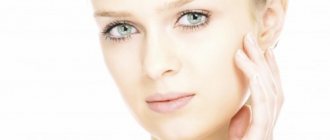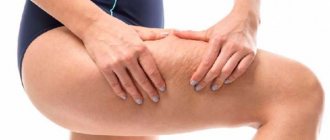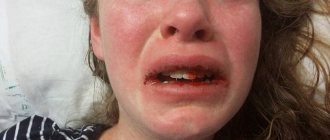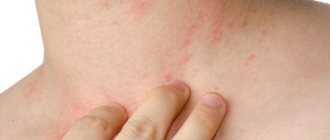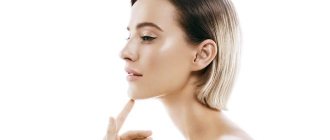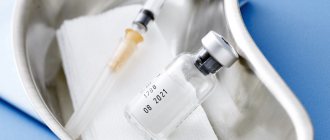Why is breast skin dry?
The situations in which the skin of the mammary gland dries out and peels off are quite diverse. These include both completely physiological and not requiring concern, and quite serious ones. And in order to understand the true reason for what is happening, it is best to consult with a specialist.
Common peeling factors
Dryness and flaking of the skin signals the unfavorable conditions in which it finds itself. And we are not talking about skin type, as such - there should be no such changes on the chest. It is necessary to look for the reason why the epithelium lacks moisture and becomes irritated. And most often common factors take part in this:
- Climatic (hot and dry air, excessive insolation).
- Environmental (dust, pollution and gas contamination of the atmosphere).
- Hygienic (clothing made from synthetic fabrics, incorrectly selected bra, frequent use of soap, inappropriate cosmetics).
- Food (insufficient amount of fluid in the diet, abuse of alcohol, salty foods).
- Medical (vitaminosis, kidney and liver pathology, systemic allergic reactions).
Changes in the breast and nipple area often accompany periodic hormonal changes observed during menstruation. Some women experience a feeling of dryness and tightness before menstruation, and others during ovulation, but this does not go beyond the physiological norm.
When breast skin suffers from dryness, it is first necessary to rule out common causes, and then conduct a more in-depth examination.
During pregnancy and lactation
When carrying a child, the body undergoes a significant restructuring of functional systems, which cannot but affect the condition of the skin and breasts. Even at the beginning of pregnancy, a woman may experience itching and dryness, which indicates metabolic changes. And with the onset of the third trimester, under the influence of hormones, the mammary glands begin to enlarge, which stretches the epithelium.
After the birth of a child, when lactation is just establishing, the nipples are subject to increased stress. The baby sucks intensively, but only colostrum comes out of the breast. And if we add to this the incorrect application, then minor injuries to the epithelium are practically guaranteed. Cracked nipples may well heal with a feeling of dryness and flaking.
Pathology of the mammary gland
The greatest concerns arise in situations where the presence of diseases affecting the skin of the breast or the mammary gland itself is suspected. The appearance of flaky spots, dryness, roughness or other symptoms of a similar nature should be grounds for excluding the following conditions:
- Contact dermatitis.
- Neurodermatitis.
- Psoriasis.
- Follicular hyperkeratosis.
- Oncological processes.
And if skin diseases affecting the breast do not pose a serious danger, then if a malignant tumor is suspected, you must be extremely careful. It is better to double-check the diagnosis by undergoing an in-depth examination.
Pathological processes require careful differential diagnosis and clarification so as not to miss dangerous conditions.
The skin around the nipple peels and itches. Prevention of gland diseases
If the skin begins to peel off severely and peel around or near the nipples, then prevention and treatment will mainly depend on the factors that influenced the development of the disease.
A woman should closely monitor the health of her entire body, eat right, eat only foods enriched with vitamins and microelements, exercise regularly and continue to keep her body in good condition, avoid all kinds of stress and overwork, find time for proper sleep and rest.
If we talk about the condition of the breast, then you need to follow some recommendations from your attending physicians:
- closely monitor the level of hormones in the body;
- if necessary, you need to increase the level of minerals and nutrients in the foods you consume;
- independently monitor the condition of your breasts and undergo regular examinations;
- during pregnancy, you need to wear a special breast-supporting bra;
- apply only tested cosmetic products to this area;
- when feeding a newborn with milk, you need to learn how to apply it to the breast correctly;
- eliminate the use of various food additives and medications or at least minimize it;
- go for an examination with a gynecologist every year;
- Rinse the laundry thoroughly after washing with special chemicals;
- choose only high-quality cotton underwear that will not cause irritation to the skin.
Sensitive skin in the chest area needs proper and careful care, especially as you age. You should try your best to avoid negative effects on the breasts and carefully monitor their condition.
You need to pay attention to your body and respond to even the slightest changes in it. Even such a minor problem as dry skin on the nipple can result in a manifestation of a dangerous disease.
What should you pay attention to?
Any processes other than physiological certainly require attention. When faced with a pathology, you cannot wait until it progresses, but consult a doctor in time. And even cosmetic problems can have clear internal reasons, which also require the participation of a specialist.
Skin changes
Skin changes are the first thing people pay attention to during examination. The following can be determined visually:
- Change in color (redness, pallor).
- Rashes (spots, papules, pustules, blisters).
- Erosions and ulcerative defects.
- Peeling, crusts, etc.
When the skin of the breast is rough and dry, this will be clearly determined by palpation, as well as whether there is a thickening or elevation in a certain area. The consistency of space-occupying formations, their localization, boundaries and sizes, mobility and adhesion to the skin, local temperature and pain - all this is also determined by palpation. Signs of a malignant process include:
- Breast deformation.
- Wrinkled and retracted skin (“lemon peel”).
- Knot of rocky density.
- Swelling of the entire gland.
If such changes affect one breast, progress gradually and are not accompanied by pain (in the early stages), then there is every reason to suspect breast cancer.
Papilla and areola
In situations where the nipples itch and peel, pay attention to their appearance (shape, color), the presence of plaque or other defects, while simultaneously examining the areola. You should find out what sensations a woman experiences in the areas being examined (burning, pain, pulsation) and what causes their development.
By palpating the nipples, they determine whether there is discharge from them and what their nature is (serous, bloody, purulent). During lactation and in the last stages of pregnancy, it is useful to find out whether breast milk is secreted well.
Additional symptoms
In addition to local signs, determined visually and by touch in the area of the problem gland, other symptoms are also important for the diagnostician. At the appointment, the doctor finds out whether your general health is disturbed (fever, malaise, lack of appetite), determines the size of the lymph nodes in the armpits, examines the second breast and pays attention to the skin as a whole (rashes, color, dryness). Every nuance can be important for making a diagnosis.
The doctor will be able to give an affirmative answer regarding the cause of dryness and flaking only after a comprehensive diagnosis.
The main reasons why nipples peel
Peeling nipples are a delicate symptom that often worries women.
There are many reasons for this, and it does not always occur as a symptom of a dangerous disease; sometimes it is caused by external factors. But nevertheless, to determine why your nipples are peeling, you will have to visit a doctor: a gynecologist or mammologist. The main reasons are:
- The period of bearing a child. At this time, important changes occur in a woman’s body. The mammary glands prepare for lactation, enlarge, and the skin does not have time to stretch. This usually starts after the 30th week. There may be some itching. Also, the skin on the nipples sometimes begins to peel off at 18-20 weeks due to the release of colostrum.
In this case, it is best to use special creams and oils to make the dermis more elastic. Children's, olive, coconut, hypoallergenic body milk and lotions have proven themselves well. And for bathing, do not use regular soap, especially laundry soap, as they dry out the skin.
- Lactation. Peeling occurs at the very beginning, since mother and child are not yet accustomed to this process. The skin of the nipples is subject to additional exposure. If the baby is not attached to the breast correctly, the baby sucks incorrectly, grabs it with his lips and pulls.
First of all, you should practice your lactation technique. And the nipples themselves need to be lubricated with creams like Bepanten, Purelan and others.
- Hives. Its symptoms appear not only on the nipples, but throughout the body. Spots and itching appear.
Do not scratch spots and blisters. You should also eliminate all allergens from your diet. And wash your nipples with decoctions of medicinal herbs.
- Contact dermatitis occurs as a result of constant contact of delicate skin with a rough and uncomfortable surface of clothing.
In this case, as with any allergy, you need to undergo allergen tests. It is also necessary to exclude all suspicious products from the menu. Exchange uncomfortable underwear for a product made from natural materials, without unnecessary seams or decoration.
- Irritation or allergies can be characterized not only by peeling, but also by scabies and hyperemia of the epidermis. They can be caused by cosmetics such as shampoo, cream, soap, balm, and washing powder. It can also occur due to a specific reaction of the skin to the fabrics of clothing and underwear.
To improve the situation, you need to change personal hygiene products, cosmetics, and synthetic fabrics to natural ones.
- Eczema. This dermatological disease is serious. Therefore, it should only be treated by a doctor. And for prevention, the diet should be enriched with dairy products, vegetables and fruits.
- Insufficient skin moisture. Women's nipples can peel off in winter due to dry air and heating appliances. Also due to too aggressive hygiene products, vitamin deficiency.
It is necessary to saturate the body with moisture not only externally, using hypoallergenic moisturizers and nourishing products, but also to maintain a drinking regime. You need to drink 1.5-2 liters of water per day, eat less salty, smoked and fried foods.
- Hormonal fluctuations. They may be associated with periods of menstruation. When ovulation or menstruation approaches. The breasts swell, the skin tightens, and slight peeling appears due to insufficient elasticity of the epidermis.
- Vitamin deficiency. Because of this, the skin can itch and flake all over the body, including the nipples.
Lack of vitamins primarily affects the condition of the epidermis. Therefore, during autumn and spring it is useful to take mineral complexes. It is advisable to get tested for vitamins and find out which ones are missing. The doctor will prescribe a suitable drug. It can be complex or with individual vitamins, for example, groups B, A, E, PP, D.
- Diseases of the mammary glands. They may often be accompanied by uncharacteristic, unusual discharge from the nipples. Cracks with dark veins appear. The shape of the nipple changes, it becomes concave.
In this case, you should immediately consult an oncologist. The patient is prescribed a biopsy.
- Bust formation in teenage girls. At this time, the breasts can increase greatly and rapidly, and vitamins are also required. All this affects the condition of the epidermis.
Expert opinion
Tatyana Somoilova
Cosmetology expert
Peeling nipples are sometimes not a sign of a dangerous disease. It is often caused by external factors. But if it causes a lot of discomfort and is accompanied by additional symptoms, then seeing a doctor is necessary. Delaying a visit can have serious consequences.
In women, nipples may itch and peel for more serious reasons:
- Menopause. During this period, hormonal changes in the body begin. It usually does not cause serious problems. But if it becomes too strong, you should consult a doctor.
- Mastitis. Due to a bacterial infection, inflammation begins in the breast tissue. It affects women during lactation. If left untreated, serious consequences can occur. Mastitis is accompanied by discharge from the nipples, pain, fever, redness, and induration.
Postpartum mastitis
- Fungal diseases, thrush. Pimples, white spots, and rashes appear in the nipple area. Antifungal drugs and immunomodulators are used for treatment.
- Malignant tumors, Paget's disease. In addition to severe itching, chest pain appears. A red rash may form on the nipples. Paget's disease is often confused by its symptoms with eczema, so an examination by a specialist is required. More often, women after 45-50 years are susceptible to this. Usually one nipple is affected.
Men's nipples often peel, which is accompanied by itching and pain. In addition to irritation, allergies can be caused by:
- Hormonal imbalance and gynecomastia. When females predominate in the male body, the mammary glands begin to grow. As a rule, this occurs in teenagers. Only one or both glands may become enlarged. It can be false, that is, due to an increase in the fat layer, or true, that is, due to glandular and connective tissue. It is less common in adults.
This disease can occur due to hormonal imbalance, genetic disorders, use of steroids and anabolic steroids, liver and thyroid diseases.
- Breast cancer and Paget's disease. It affects people over 50-60 years of age. It may additionally be accompanied by bloody discharge, ulcers, pain and induration, bright redness of the nipples and surrounding skin.
- Mondor's disease. An extremely rare pathology. It is superficial thrombophlebitis. In addition to peeling and itching, it is accompanied by pain in the nipples, tightening of the skin in the affected area, and seals. Often confused with cancer. But, as a rule, there are no serious complications.
- Disorders of the testicles, pituitary gland, adrenal glands. Failures in their functioning lead to hormonal imbalance and decreased testosterone production. If the symptoms are left unattended, feminization of the body will begin: female-type obesity, breast enlargement, infertility. The most important warning sign is swelling and pain in the lower part of the nipples.
- Injuries. Painful sensations appear after blows, bruises, scratches, cuts. Once the injury heals, the discomfort goes away.
- Infection. Any illness or injury can lead to infection by pathogenic microorganisms. As a result, purulent inflammation of the nipple and surrounding skin begins, which is accompanied by ulcers, pain and redness. Medical intervention is required. Disinfection and antibacterial therapy are carried out.
How to get rid of it?
It will not be news that in order to eliminate dryness it is necessary to influence the cause of its occurrence. In the most common situations, breast skin requires proper care. It is worth giving up aggressive detergents and drying lotions, replacing them with delicate cleansing, softening and moisturizing products (foam, milk, creams). Homemade breast masks made from available ingredients will also help with care:
- Oatmeal, milk, honey, butter.
- Banana pulp with olive oil.
- Crushed oatmeal with grated carrots.
At the same time, it is necessary to normalize the drinking regime and the intake of vitamins from food. During breastfeeding, it is recommended to treat nipples with ointments based on medical lanolin and dexpanthenol. This helps eliminate dryness and faster healing of damage. Lotions made from decoctions of chamomile, string, lemon balm, as well as lubricating the skin with almond oil will help relieve itching during pregnancy.
By removing the allergen (underwear, cosmetics), you can eliminate the skin reaction itself, which is the effectiveness of elimination therapy. If the disease has acquired the character of neurodermatitis, then the use of antihistamines and corticosteroids will be required.
The only situation where radical correction is necessary is breast cancer. Unfortunately, in other cases the prognosis becomes disappointing. Surgical removal of the tumor is combined with radiation, hormone and chemotherapy. There are also biological drugs that act on certain receptors on cancer cells.
